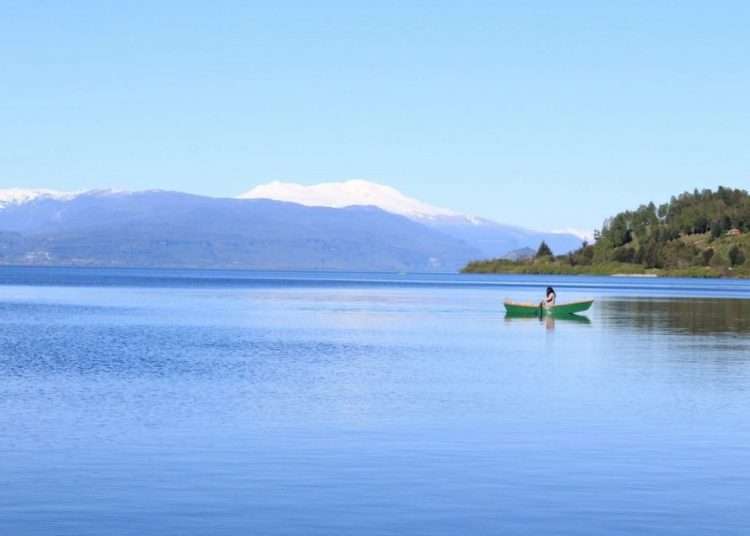Love is using a pillow
for the weariness of each day;
it’s sunset alive
in the craving of the blind seed
that lost the course of light,
imprisoned by one’s land,
defeated by one’s own land…
Love is untangling tangles
of paths in the darkness:
Love is being a path and being a ladder!
Dulce Maria Loynaz
When I asked her where her home was today, Aimeé’s1 eyes were a compass more accurate than any map. From the outside, I would say that her home looks more like the image she sees in the mirror than an intersection of cartographic coordinates. She is 34 years old, she is Cuban and sees herself as a “woman on the move.” In a post that I found on her Instagram profile, it reads: “A day like today…I left my crib and the people I loved the most (and still love). It has been the hardest and most accurate decision I have made in my life. I don’t regret it for a single second.” A panoramic photo of Havana at dawn, one of a Chilean beach and another in which an Aimée from behind shows off her traveling backpack, make up the carousel of images that she chose to illustrate this post. Her feet and her curiosity led her to the southern cone of America, to a Chilean city called Valdivia, where she went to do her Master’s in Communication in 2016.
Today she lives in Santiago — in Chile —, she is also a photographer, digital data analyst and calls herself a nature lover. Like almost all islanders, she has a special connection with the sea: “I love vessels and boats and seeing scenes of fishers. I think it is a match that my mind makes with the late afternoons in front of the Malecon seaside drive. It’s like watching the same scene, but from several different places. I enjoy it, but not missing it, but thinking about how good it is to see it again,” she tells me.
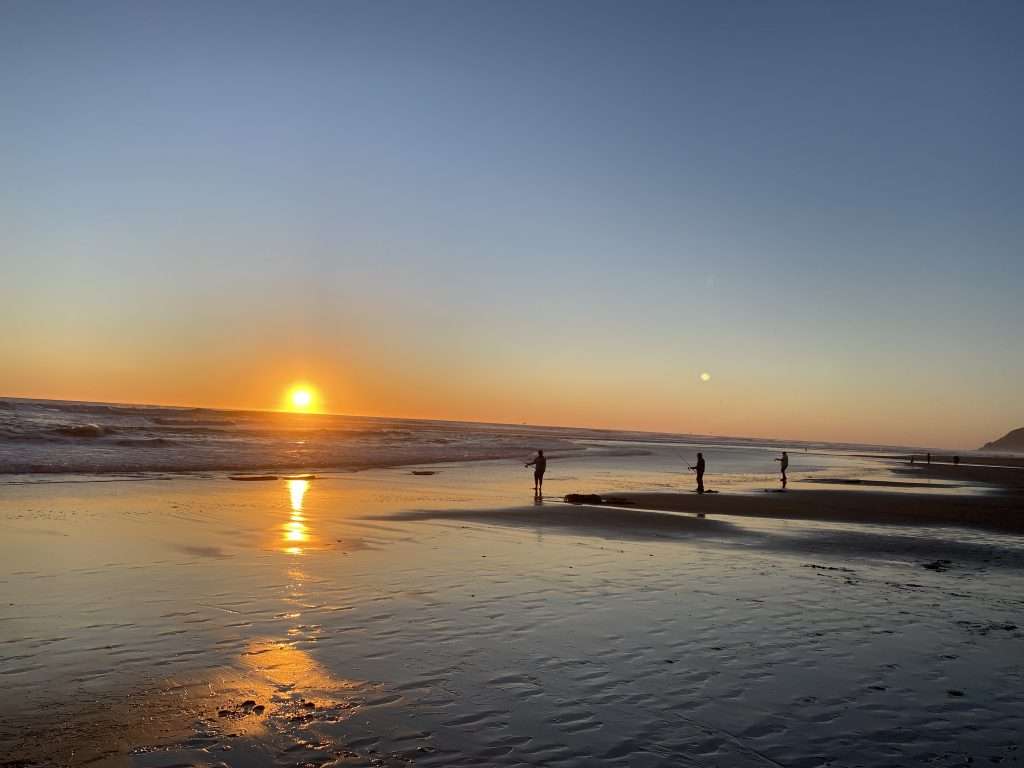
For Aimeé, happiness is a decision and she chooses it daily with great determination. Her home, which instead of a floor and four walls rests on her two feet, which are its foundations, has moved around the world since he decided to leave her mother’s house in Havana’s Cerro district, her longtime partner, a comfortable post in a research center and all the certainties that until then she had to find out what life would look like on the side of the sea that bathes the Pacific, return to study and fulfill herself professionally, or at least try: “I consider myself a migrant woman because I moved and I plan to continue moving; I feel that I still don’t have a fixed physical space, I still don’t feel that this is where I’m going to die,” she told me, because according to her “the most difficult thing, which was leaving behind the streets of my childhood, the typical food, the daily routine, I already did it; which is not to say that it doesn’t hurt, so yes, I consider myself a migrant, because after doing that I feel like I could go anywhere. If Chile turns out to be small tomorrow for me, then I’m going to another place.”
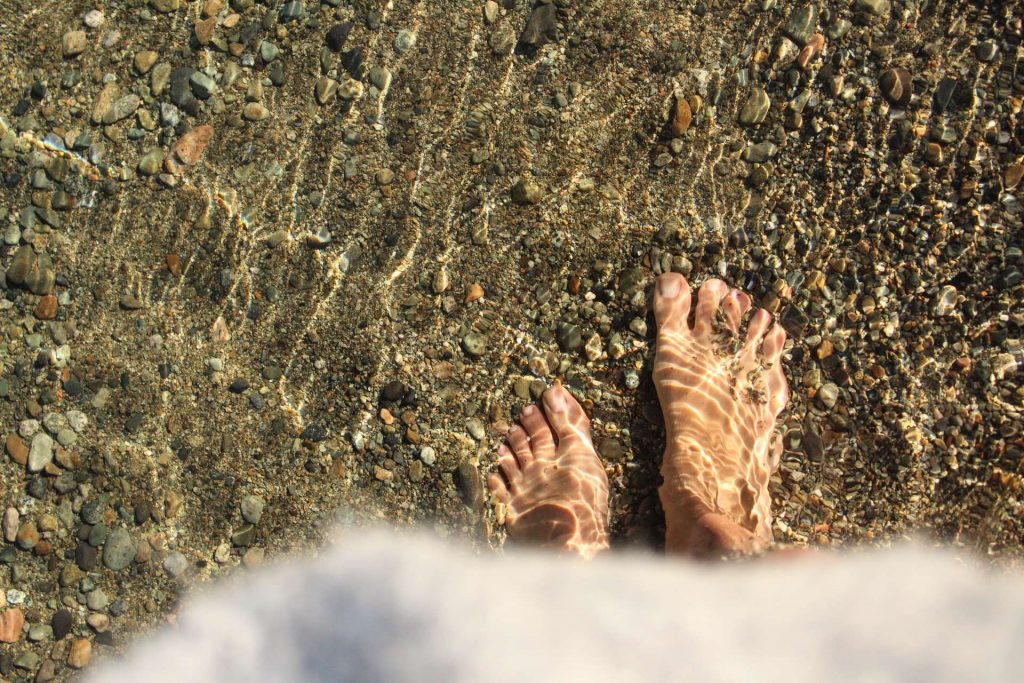
In Chile, Aimeé has no one to tie her down. According to what she tells me, she has not hung pictures on the walls of her apartment either because she prefers to save the money that she would invest in furnishing it to spend it on other experiences, such as trips. She carries with her a mini painting of some Cuban butterflies “that I love,” she told me, “it was a gift I was given at a special moment. It is one of the things that I always put first in my suitcase, and it has visited several homes with me. As well as a chain that my mother gave me before I left and a collection of poems by Dulce María Loynaz.”
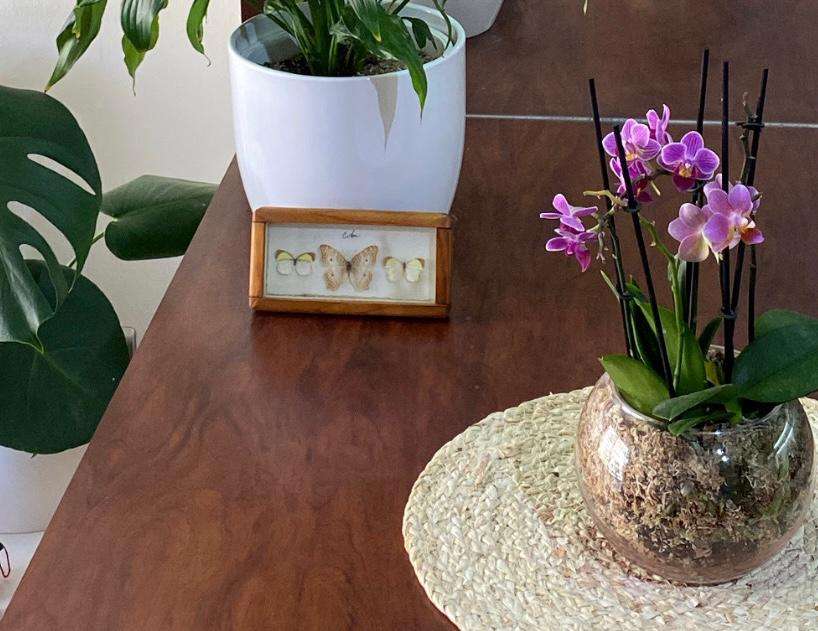
Although it is still difficult for her to feel the place she lives in as her home, she has her plants there, gives herself sunflowers or tulips every week and tea is a frequent companion after she finishes her teleworking days. This is how she received me in her living room on a Thursday night (thanks to Google Meet): moving the infuser in circles in her tisane, and with a smile on her face, a little not knowing what to expect from our conversation. I confess that I didn’t have a very clear idea then of the direction it would take, like almost every trip that is done half blind, but it is done. I hadn’t heard her voice for a few years, I think since we graduated together from the Communications career at the University of Havana in 2013 and each one took a different course; We wrote to each other sometimes, but being able to listen to her tell me her story as a migrant woman made me, somehow, (re) get to know her, and notice some things that a WhatsApp conversation would not allow me to see. After seven years living in Chile, it did not surprise me one bit that her accent was no longer the same, some words in her repertoire are no longer those of the Spanish we speak in Cuba but the one that is spoken in Chile. She says “pega” instead of “trabajo” (work), “plata” instead of “dinero” (money) and “bacán” instead of “bueno” (good). She says it’s good to hear me, that she feels as if she’s coming home through my Cuban accent: “You haven’t lost it one bit.” She also says that leaving her home and Cuba, her mother’s comfortable “nest,” gave her the opportunity to learn to fend for herself, to know herself much more than she could imagine: [migration] “gave me the opportunity to think of me. I felt that my personal life project was detaching itself from what Cuba could offer me, both from the economic point of view, as well as in the sphere of the couple, the family, the professional. What Cuba wanted from me I could never be, or I didn’t want to, and that’s why I left.”
For two hours we talked about what it means for her to be a black, Cuban and migrant woman living in Chile.
***
Aimeé emigrated through an academic mobility process in 2016, after the recent Cuban immigration reforms. She then received a “full” scholarship to study for a Master’s degree in Communication at the Austral University of Chile, located in Valdivia, a city of about 140,000 inhabitants. “At the time I came to live in Chile there was very little Cuban migration here, when I arrived, they thought I was Colombian.” She chose the Austral University among all the ones she had applied to because, first of all, her scholarship would be “full,” that is, in addition to covering the cost of her tuition, she would receive a monthly stipend that would be enough to rent an apartment and cover her main needs. She then did not know anyone in Chile, her closest contact with someone minimally known was a friend of her cousin, with whom she exchanged a couple of times and not much else. For Aimée, the migratory experience was less lonely because she had the support of her cousin, who from the United States was always present in her life, and of a couple of Cuban friends who lived in Brazil at the time: “they guided me, they taught me how to do my curriculum, the things I had to put, they supported me with my thesis, they assisted me to help me find a job in Chile and they connected me with friends of theirs here. I really felt their company, even though we were on different countries. What I mean is that the support network often shrinks and other times it expands. And the role that known and loved Cubans play is very important in the migratory experience. I feel that Cubans accompany the migratory experience of the others, so that they live it in the best way. It is a kind of wisdom that is passed on, a wisdom that embraces, protects and accompanies. In my case, keeping in touch with them and telling about our lives was part of having a smoother immigration experience.”

Aimeé tells me that she has been very lucky in her career outside of Cuba, despite having arrived in Chile alone and “empty handed.” She has never been homeless, nor illegal, nor has she experienced economic hardship, because shortly before finishing her master’s degree she decided to apply for permanent residence and was fortunately approved. Despite the fact that there is racism in current Chilean society, as a black woman she has never had a direct experience of racial discrimination in Chile, although of xenophobia she did: “One day I was looking for a book in the university library and an official asked me where I was from, then, when I told her that I was from Cuba, she started imitating my accent and asking me if I was going to stay in Chile or not because the country was full of foreigners. But, despite that unpleasant moment and the fact that racism is present here, I never directly felt discrimination for being black or for having curly hair, on the contrary, my process of assuming my natural hair began when I came here and realized that the weather and the hair straightener did not get along, and then I went through other awakenings along the way that led me to assume my natural hair once and for all.”
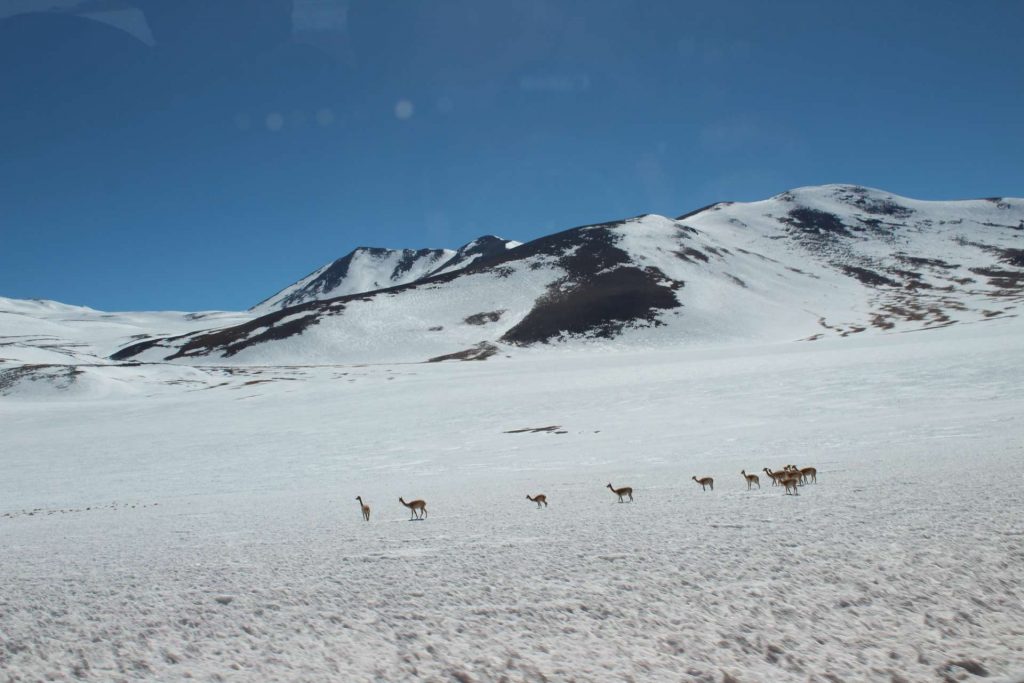
After finishing her master’s degree, obtaining permanent residence and building some emotional ties in Chile, she decided she would try to stay there and look for work, because she felt that it was time to get out of academic secrecy and do practical things in which, since she studied communication in Cuba, was always her passion: digital communication. With the help of her partner at the time, who was Chilean, Aimeé studied the ways to apply for a position in a company, she tells me, but not without first investing part of her savings and her time in qualifying: “I wanted to join a company and I studied the way to achieve it. When I realized that my Master’s degree would not be enough, I did a degree in Community Management and that opened the doors for everything else. At that time, I had to travel from Valdivia to Viña del Mar and I paid everything with my money, with the help of my partner at the time; it was a bummer but in the end I managed to finish it. Then I started applying for jobs and, a bit because I’m very lucky, I found out that the media agency where I worked for a while was looking for a community manager to stay for 12 months, I passed my resume, I did the interview and I got in, at first as a substitute for a person who had left for maternity leave and then I managed to get my work noticed and stay in the company; that’s where I started learning. At first it was very difficult because I had no experience, I did not know how to enter the market and everywhere contacts are very important.” Despite the difficulties, Aimeé has since managed to maintain professional and financial stability working in what she has always wanted. However, she also feels that, despite not regretting one bit of having invested time and resources in her professional development since the beginning of her migration process, her family and personal life have been compromised and she has begun to feel a desire for that which she has not had time to prepare, especially after having separated from her current ex-partner, which is to be a mother and start a family.
“I feel that now I have the privilege of deciding to be a mother after self-realization. When I was in Cuba I didn’t consider motherhood because I just felt that it would limit me from going out, traveling and fulfilling several of the dreams I had. Although today I feel stable professionally, I still don’t think I have the necessary conditions to be a mother, although I am already feeling the biological call. First, because I don’t want to be a single mother, I want to have support and a division of responsibilities in this process; it’s not that I don’t feel capable of nurturing a life on my own, but rather that I simply know that being accompanied will be much better and fairer for me for everything that just being a mother implies, even more so in a foreign country where I have no support network to help me. I feel like I want to start a family and that, in my case, includes having a partner. My family project is on hold right now because I can’t find a person who meets the requirements that I want the person who is going to be the father of my children to meet. And well, if motherhood isn’t for me, it won’t be the end of the world either, other experiences will come, including the possibility of connecting in the future with a person who already has children, who knows. On the other hand, supporting myself financially and dedicating myself so much to my work does not leave me much time to meet people; I feel like my professional life is where I want it to be, but I still need to level up my family life.”
To all of the above, the cultural variable is added to the equation. According to what Aimée told me, she is not closed to the possibility of forming a multicultural family and in fact it is an idea that she has been getting used to little by little, because in addition to having little contact with Cubans where she lives, she feels that she is genuinely attracted by the idea of having a more diverse family and this also has to do with the fact of feeling part of that society. However, what has most led her to postpone motherhood, for the time being, lies fundamentally in her condition as a pioneer of her own migratory project and, in addition, in continuing to be an important economic support for her family in Cuba: “Establishing a relationship becomes more complex due to cultural issues and how each person in the relationship experiences their culture. I am not closed to having a multicultural family, but first I have to know how to balance the professional part with the personal part because in the first place I am currently my breadwinner, just as I am in many ways for my family in Cuba, despite the fact that my mother has always given me the freedom to put my needs above hers, but it’s a lie, I am always aware of what my family on the island may need, there are the cell recharges, the combos, sending them a good amount of money whenever I can, then motherhood has not yet presented itself as a part of my current life.” Having her family and her friends away from her also stops her in many ways from launching herself into motherhood, because, according to her, she told me: “Here I have built ties, without a doubt, but the support network is always to the test.”
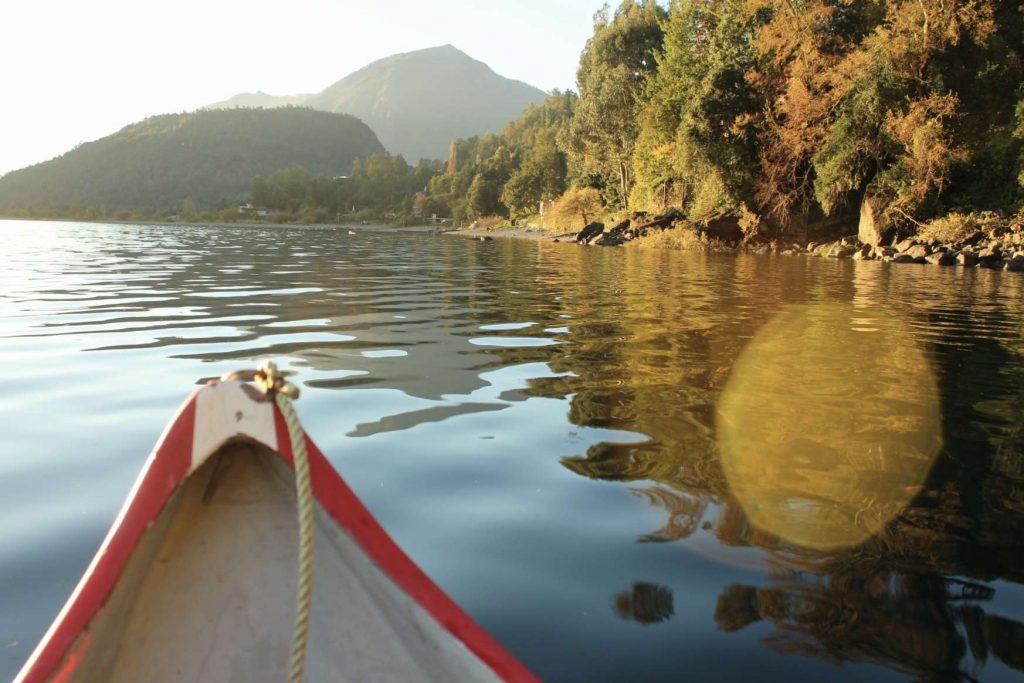
In the midst of those doubts, for the moment, Aimée goes on. She works, still treating herself to fresh flowers and she later paints them at her watercolor classes every Saturday. She dreams of forming a new family, in addition to the one she has in Cuba, but she is and plans to continue being a woman on the move, she wants to travel, see the world and remove the stigma, against which she herself is fighting, that something is going to happen to her for daring to do it; she does not allow herself to be paralyzed by the fear she feels when she thinks about what it means to be a woman alone in a world so big, so hostile, but also so full of experiences and an immense space that she insists on occupying, accompanied or not. Her only certainty and her only foundations, at least the most important ones, are her two feet and her ability to move from one place to another to look for what makes her happy, even if she doesn’t always get it, or even if the challenges keep coming up.
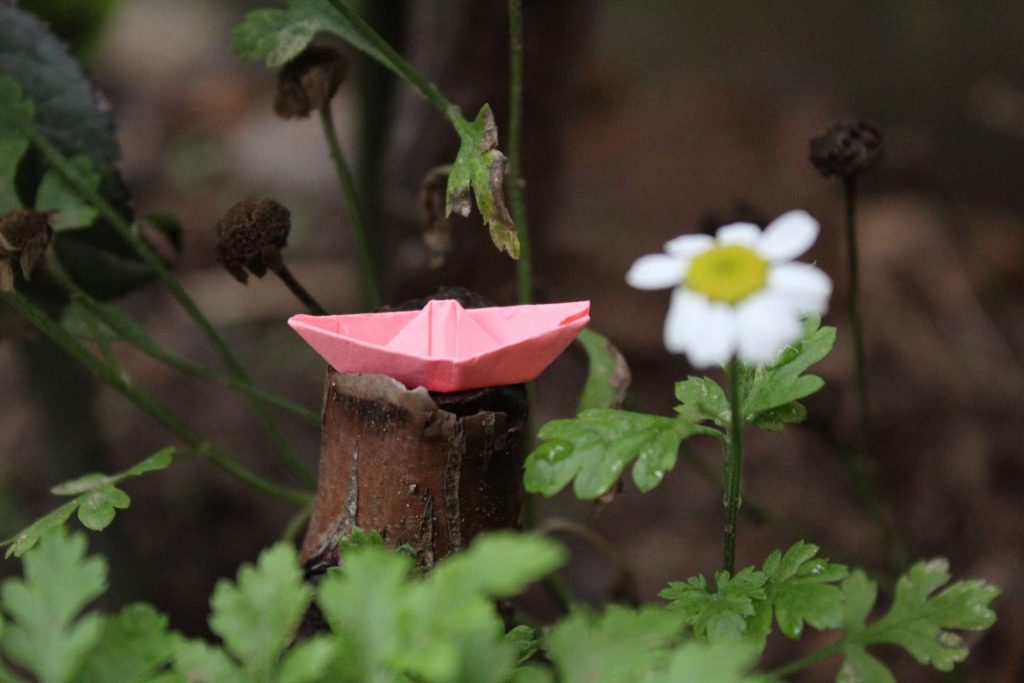
Cuba is present in her life through music, although she doesn’t know what is being heard there now, she tells me. She also finds Cuba by returning to the congrí, the chicken with sauce and the plantain fufú or the fried egg with rice and a banana at lunch, “to get by.” “Cuba is in my creativity, in my ability to invent with what little I have, in the kitchen, but also in life, in my ability to discover which came first, the hen or the egg, in any situation that comes my way,” she tells me laughing. The painting of butterflies that she took from Cuba is still with her, but she does not hang it and will not hang it on any wall of any place she may inhabit, because she knows, like Cavafy, that Ithaca, more than an island or a destination, will always be the path under her feet.
***
Note:
1 At the request of the interviewee, we used a fictitious name to preserve her anonymity.

